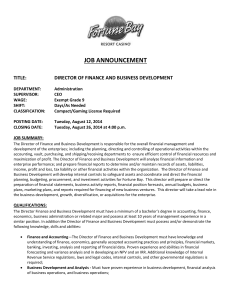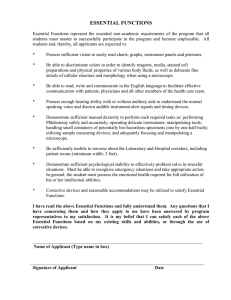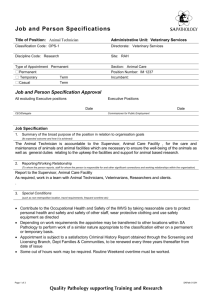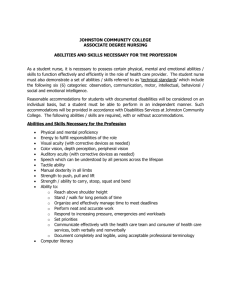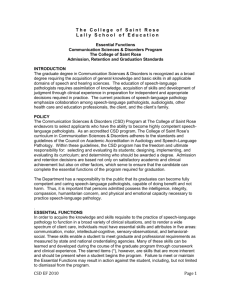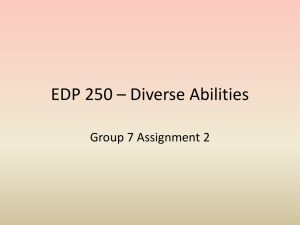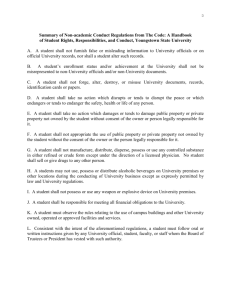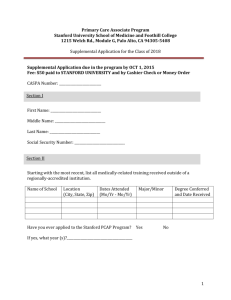Essential Function - University of Central Missouri
advertisement
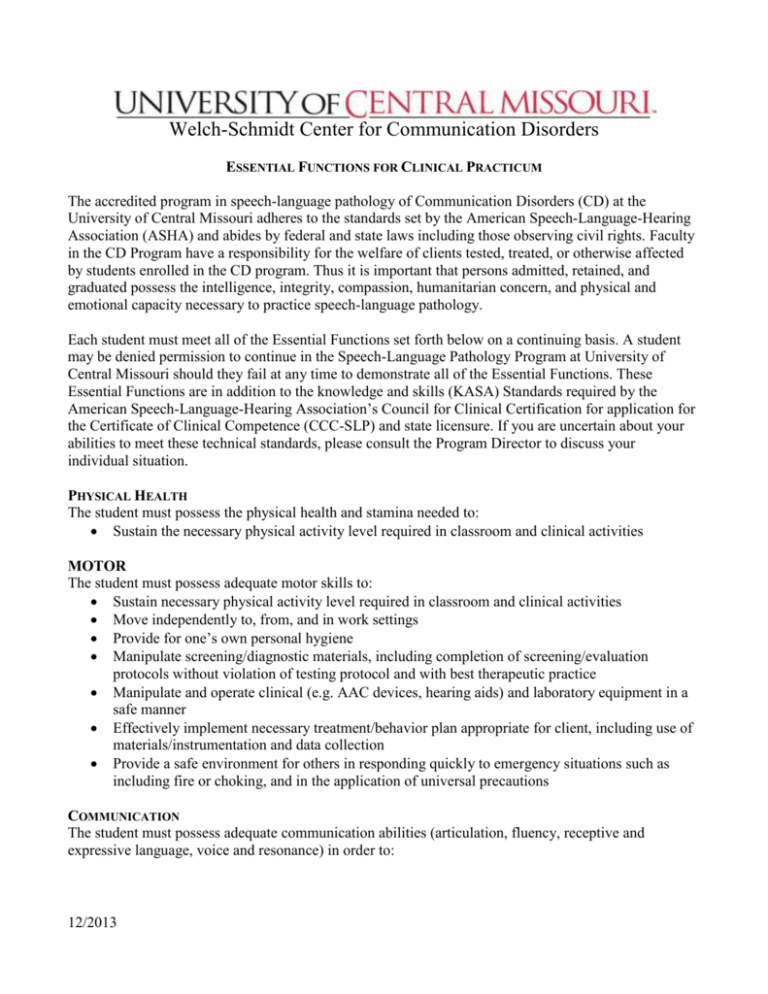
Welch-Schmidt Center for Communication Disorders ESSENTIAL FUNCTIONS FOR CLINICAL PRACTICUM The accredited program in speech-language pathology of Communication Disorders (CD) at the University of Central Missouri adheres to the standards set by the American Speech-Language-Hearing Association (ASHA) and abides by federal and state laws including those observing civil rights. Faculty in the CD Program have a responsibility for the welfare of clients tested, treated, or otherwise affected by students enrolled in the CD program. Thus it is important that persons admitted, retained, and graduated possess the intelligence, integrity, compassion, humanitarian concern, and physical and emotional capacity necessary to practice speech-language pathology. Each student must meet all of the Essential Functions set forth below on a continuing basis. A student may be denied permission to continue in the Speech-Language Pathology Program at University of Central Missouri should they fail at any time to demonstrate all of the Essential Functions. These Essential Functions are in addition to the knowledge and skills (KASA) Standards required by the American Speech-Language-Hearing Association’s Council for Clinical Certification for application for the Certificate of Clinical Competence (CCC-SLP) and state licensure. If you are uncertain about your abilities to meet these technical standards, please consult the Program Director to discuss your individual situation. PHYSICAL HEALTH The student must possess the physical health and stamina needed to: Sustain the necessary physical activity level required in classroom and clinical activities MOTOR The student must possess adequate motor skills to: Sustain necessary physical activity level required in classroom and clinical activities Move independently to, from, and in work settings Provide for one’s own personal hygiene Manipulate screening/diagnostic materials, including completion of screening/evaluation protocols without violation of testing protocol and with best therapeutic practice Manipulate and operate clinical (e.g. AAC devices, hearing aids) and laboratory equipment in a safe manner Effectively implement necessary treatment/behavior plan appropriate for client, including use of materials/instrumentation and data collection Provide a safe environment for others in responding quickly to emergency situations such as including fire or choking, and in the application of universal precautions COMMUNICATION The student must possess adequate communication abilities (articulation, fluency, receptive and expressive language, voice and resonance) in order to: 12/2013 Communicate professionally and effectively with patients, colleagues, other healthcare professionals and community of professional groups (in both oral and written English language) considering the communication needs and cultural values of the listener The student must also: possess adequate oral and written English language abilities sufficient to meet curricular demands including the ability to model English phonemes BEHAVIORAL AND SOCIAL ATTRIBUTES The student must possess adequate behavioral and social attributes to: Maintain emotional and mental health required for use of intellectual abilities, prompt completion of responsibilities, and development of appropriate relationships with clients and colleagues Maintain composure and emotional stability in demanding situations Adapt to changing environments and situations Understand and respect authority Maintain appropriate professional behavior Participate in collaboration with other professionals Comply with administrative, legal, and regulatory policies Demonstrate regular class attendance and meet responsibilities in a timely manner Accept and employ appropriate suggestions and constructive criticism Dress appropriately and professionally COGNITIVE ABILITIES The student must possess adequate intellectual/cognitive skills to: Demonstrate the mental capacity to learn and assimilate professional information, including the ability to comprehend professional literature and reports Solve clinical problems through critical analysis Seek relevant case information, synthesize, and apply concepts and information from various sources and disciplines Generate discipline-specific documents and clinical reports in English Analyze, synthesize, and interpret ideas and concepts in academic and diagnostic/treatment settings SENSORY The student must possess adequate sensory skills of vision, hearing, and touch to: Identify normal and disordered articulation, fluency, language, voice, resonance, swallowing, cognition and hearing abilities. Participate effectively in the classroom, laboratory and clinical settings (e.g. use of diagnostic instrumentation, discrimination of findings on imaging studies). Student Signature___________________________________________Date_______________ 12/2013 Procedures for Essential Functions Dissemination: The List of Essential Functions for the CD program will be included with the admission to the program notification. Students will sign and return the List of Essential Functions to Communication Disorders to be placed in their file and keep a copy for their records. This list will also be found on the Clinical Practicum Blackboard site for student and faculty reference. Procedure when student does not meet an essential function: Instructor/clinical instructor identifies student as not meeting an essential function. Instructor/clinical instructor alerts student’s advisor and program director (if identified in academic setting) or director of clinical services (if identified as a part of clinical practicum). Conference will be held with instructor/clinical instructor, program director/ director of clinical services, and student’s advisor to review concern with student and determine recommended course of action. Documentation of the conference and recommended course of action will be placed in student’s file. 12/2013
